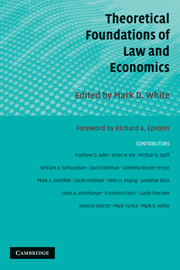Book contents
- Frontmatter
- Contents
- Foreword
- Preface
- Notes on Contributors
- PART ONE THE ROLE AND USE OF ECONOMICS IN LEGAL STUDIES
- PART TWO EFFICIENCY
- PART THREE RATIONALITY AND THE LAW
- 8 Bounded Rationality and Legal Scholarship
- 9 Emotional Reactions to Law and Economics, Market Metaphors, and Rationality Rhetoric
- 10 Pluralism, Intransitivity, Incoherence
- PART FOUR VALUES AND ETHICS IN CIVIL AND CRIMINAL LAW
- Index
- References
8 - Bounded Rationality and Legal Scholarship
Published online by Cambridge University Press: 06 July 2009
- Frontmatter
- Contents
- Foreword
- Preface
- Notes on Contributors
- PART ONE THE ROLE AND USE OF ECONOMICS IN LEGAL STUDIES
- PART TWO EFFICIENCY
- PART THREE RATIONALITY AND THE LAW
- 8 Bounded Rationality and Legal Scholarship
- 9 Emotional Reactions to Law and Economics, Market Metaphors, and Rationality Rhetoric
- 10 Pluralism, Intransitivity, Incoherence
- PART FOUR VALUES AND ETHICS IN CIVIL AND CRIMINAL LAW
- Index
- References
Summary
Any normative framework that has the structure of recommending that decision-makers advance certain goals, and that they do so in accordance with decision theory (DT), runs into the problem of bounded rationality. The problem is how to refine DT so as to be usable by a bounded decision-maker – someone with limited cognitive resources, for whom the full evaluation of her choices is impossible or at least very expensive.
This chapter has two aims. The first, pursued in sections I and II, is to discuss the problem of bounded rationality in general terms. The second, pursued in section III, is to show why the problem creates a gap at the foundations of legal scholarship. In Fairness versus Welfare, Louis Kaplow and Steven Shavell propose a welfarist methodology for legal scholarship. They may be wrong to think that morality is wholly welfarist, but a normative program that says that social welfare is one of a plurality of criteria by which legal scholars should evaluate laws and policies is plausible. But we have no good normative handle on how legal scholars who are bounded in their cognitive abilities should implement a welfarist or pluralistic program.
THE PROBLEM OF BOUNDED RATIONALITY
The term “bounded rationality” is sometimes used by psychologists to describe or explain certain decision-making processes without endorsing or criticizing them. By contrast, the problem of bounded rationality that I discuss in this chapter is normative.
- Type
- Chapter
- Information
- Theoretical Foundations of Law and Economics , pp. 137 - 162Publisher: Cambridge University PressPrint publication year: 2008



